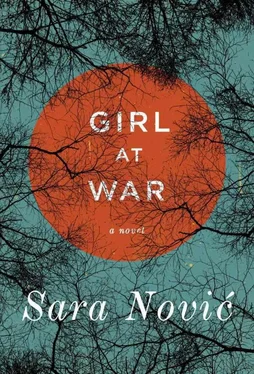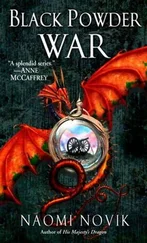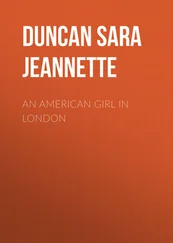“Odd,” I said.
“Did they put sanctions on you? They’re putting sanctions on everyone and their mother these days.”
“I’m gonna give you all sanctions if you don’t come play,” said Rahela, squeezing between us on the bench.
“Surprisingly accurate use of the word,” I said. In the scorekeeping computer, Jack named us after Taxi Driver characters, and we all bowled terribly and laughed hard and for a few hours that was enough.
Going to bed was a different story. During my first months in America I’d tried to fend off the nightmares by avoiding sleep altogether. I sat up keeping watch, worried that someone would break in and slaughter Jack and Laura. Then when I tried to give in, I couldn’t get comfortable. A mattress and box spring was a stark contrast to the cushions of my Zagreb couch; my back hurt and I twisted beneath the sheets.
Most nights, I’d give up and tiptoe down the stairs, through the kitchen, and into the family room, where Jack would be playing the guitar. When I appeared at the edge of the room he would sigh, then motion with his head for me to come and sit. A striped blanket hung on the back of the nearby armchair, and I’d pull it off and trail it behind me on my way to the couch. Jack would continue to play, swaying slightly as if to console himself.
Spring nights he’d lean his guitar against the sofa and flip on the television to watch baseball. The Mets were his team, a vestigial preoccupation from a childhood played out in the Italian ward of Newark. Muting the volume, we’d watch the silent game and he’d tell me the names of the players and their batting averages, explain foul balls and strikes and ground rule doubles. He repeated himself when I didn’t understand, and when he sensed me getting overwhelmed he stopped, content to sit quietly in the television flicker. Baseball lingo permeated my vocabulary, and though I knew I didn’t need to talk to make him happy, I learned more English by discussing the specifics of the game. Baseball calmed me down; every play and mistake had corresponding consequences, each scenario governed by a set of regulations I could memorize. It was a game I imagined my real father would love as well, the steady cadence of throwing and swinging as rhythmic as a whispered song, the innings’ narrative arc like a bedtime story.
When the Mets invariably lost, Jack would switch off the TV and return to his strumming and swaying. I’d lie down with my ear pressed to the leather of the couch and match my breathing with the vibrations of my father’s music.
Now, though, it was both too early in the season and too late at night for baseball; even Jack was probably asleep, so I lay awake through the uneasy hours for as long as I could before the dreams set in.
“You sleep okay last night?” Laura said the next morning.
“Bad dream.”
“I thought I heard you yelling.”
“Sleep-talking.” When I was little, I’d wake her several times a week that way.
“Does it happen at school?”
“God no.”
“You sure you don’t want to talk? You never really told me how the UN thing was.”
“I don’t want to talk about it,” I said, though I loathed the disdain in my own voice. “I’m going out.”
I retreated to my room, pulled on jeans and a sweater, and made to leave, then caught a glimpse of myself in the hall mirror, disheveled, and doubled back for my brush. My hair hung down past my shoulder blades and had darkened with age, was the sandy brown color of my father’s. The freckles across the bridge of my nose were faded from winter, but they would multiply at the first hint of sun. My eyes, so dark they were almost black, had bothered me in my teenage years — incongruous, it seemed, with both my paleness and the blond, blue-eyed model in every American ad and magazine. But now I saw they were unmistakably my mother’s, perhaps the single feature we shared. I pulled my hair into a ponytail and went downstairs.
I spent the morning and into the afternoon in a coffee shop — built two years ago to look old — working on a paper about Wide Sargasso Sea and wondering how it was possible that whenever I was in one place I could feel so sure I belonged in the other. Brian had left a voice mail asking if I wanted to have dinner. I called him back but was relieved when he didn’t pick up. I pecked out a text message instead, saying that I had gone to visit my family but I would see him on Sunday, and I was sorry for not having called sooner. I left the phone atop my notebook for a few minutes, waiting for him to write back, but he didn’t.
Behind the bar a boy I’d had a crush on in high school appeared from the back room and began scraping coffee grounds from the cappuccino machine. I tapped him on the shoulder and we attempted an awkward, over-the-counter hug.
“You on spring break, too?” Zak said.
“Yeah,” I lied.
“But you’re not working?” He nodded in the direction of the Kmart across the lot, where I worked summers.
I told him I needed the extra study time, but that it was good to see him, and made a halfhearted return to my stack of homework.
“Well, I was about to take lunch,” he said, coming out from behind the counter. “Wanna go over anyway? Old times’ sake?”
Zak and I had belonged to intersecting circles of friends throughout high school, and had over the years flirted in sarcasm and baseball jargon. He loved the Phillies; I’d assumed the Mets as my own cause, and whenever we found ourselves at a party together we bickered about which team was worse. We became friends in our own right in the final year of high school, and took to sitting in the back of Zak’s car, listening to sports radio and kissing.
In the summer before we’d gone off to college, Zak had often trekked across the parking lot to visit me, and we’d played Wiffle ball in the back of the store. Now we slipped through the automatic doors and passed by Sporting Goods to collect a bat.
“You still dating that guy at school?”
“Yeah.”
“That’s too bad.”
We found some space in the patio furniture aisle, and Zak put on a show of pitcher’s stretches. “I’m glad you’re around. This town gets smaller and weirder every time I come back.”
“It was always weird,” I said.
“My parents are going gray.”
“That’s your revelation? Your parents’ hair?”
“You’re the worst.” He threw the ball with more force than he should have, and I connected bat and ball with a satisfying thwack. The ball careened out of Outdoor Living and into Health and Beauty, taking out the deodorant display in a domino-style cataclysm. From behind the rubble an arthritic, red-vested woman threw us a look of contempt.
“SECURITYYYYY!” she roared, a sound incongruous with her tiny frame. A fat man with armpit stains emerged from the stockroom; I recognized him, but he didn’t know me, or didn’t care. He stared at the deodorant, then at us, and adjusted his flashlight belt holster.
After we’d been searched for evidence of shoplifting and ejected from the store, I walked Zak back to work.
“I know what you mean, about feeling strange being here.”
“I know you do,” he said, and kissed me on each cheek.
“How European of you,” I said. In truth he had startled me. I tried to think of some tipsy exchange in which I might have revealed something about my past, but was sure I hadn’t. Back behind the counter, Zak mixed me something caramel-flavored, and I sat for an hour paging through notes and glowering at my blank notebook, producing a single sentence before I gave up and went home.
—
That night Rahela appeared in my doorway in her pajamas. “Whatcha doing?”
“Homework. What are you doing?”
Читать дальше












